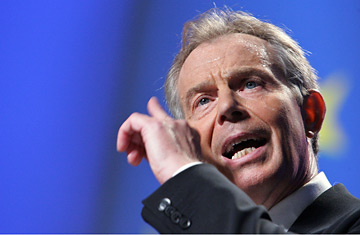
Former British prime minister Tony Blair speaks at a meeting of the French ruling conservative party, the Union for a Popular Movement party (UMP)
It probably says everything about his current place in history that the former Labour Prime Minister of Euro-skeptic Britain, Tony Blair, chose to kick off his unofficial drive to become the European Union's first president by seeking support from conservatives in Euro-enthusastic France. Suffice to say that he may find the road to the E.U. presidency a bumpy one, as his weekend sojourn in Paris proved.
Though he made no overt comments about a bid to become the E.U.'s first president next January, Blair's repeated references to Europe, globalization, and bipartisan efforts to reform and modernize made his aspirations evident. So, too, did Blair's role as guest speaker at the Saturday meeting of 2,500 leaders from the rightist Union for a Popular Majority party of French President Nicolas Sarkozy. The assembled conservatives applauded the former U.K. premier's calls to "take the future by the horns" and resist "retreating to comfort zones of out-dated slogans and old remedies".
"Today, one thing is as important between the distinctions between left and right: the difference between policies turned towards the future, and those stuck in the past," Blair told his enthralled audience in French. "Like a rising tide, globalization can not be rejected. In a world of change, woe is he who stagnates."
The speech was designed to stake Blair out as a man capable of taking the E.U. to the same place his supporters say he brought Britain: the fabled "third way" between costly welfare states, and unfettered, even savage market forces. In a recently expanded Europe where attitudes in its older members, such as France with its generous social security systems, often clash with newer entrants with far less protection as with Latvia, the promise of Blair finding common ground as he often did in Britain will be inviting to many people. Elsewhere, however, he'll find hostility to his vision — and his positioning — just as strong.
Take the French Socialists, for example. Though their former presidential candidate Ségolène Royal had previously contrasted the general feeling scorn towards Blair among France's leftists with comments that she found several of his social and economic policies appealing, she admitted finding it "strange" how the former Labour leader was snuggling up with rightists in her back yard. "If I'd been invited to address English Conservatives, I'd have abstained out of friendship to Labourites," said Royal. She explained Blair's decision to the contrary on his cynicism in "accepting all invitations because he's campaigning for the future presidency of the European Union".
The spectacle of Blair joining forces with conservatives like Sarkozy to strengthen his bid for the E.U. presidency may also irritate the leftist and center-leftist leaders of Spain, Portugal, and Italy. For that reason, Blair's joke about his reaction to Sarkozy's policy of governmental opening to former members of leftist parties may ring sinister in some ears. "In the United States I'd be a Democrat, and in the United Kingdom I'm a Labourite," Blair quipped in his speech. "And in France, I'd be ... in the government!"
But even beyond political divides, Blair's biggest handicap in seeking the E.U. presidency is the one that inspired him to relinquish power in the U.K. last year: his significant unpopularity for his resolute partnership with the U.S. in its launch and persecution of war in Iraq. And that, Socialist Party leader François Hollande stated, is why Blair is unfit for the E.U.'s top job. Europe's presidency "will be about European policy, and about European independence from the United States," Hollande said. "I don't think Tony Blair corresponds to that profile."
